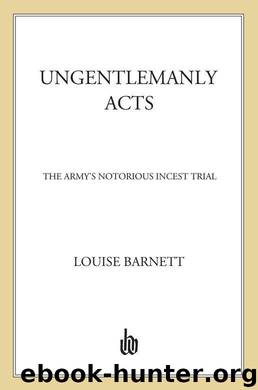Ungentlemanly Acts by Louise Barnett

Author:Louise Barnett [Barnett, Louise]
Language: eng
Format: epub
Publisher: Farrar, Straus and Giroux
Published: 2001-04-14T21:00:00+00:00
In describing Orleman’s March illness, which he had treated, Dr. W. C. Henderson was forced to make several admissions. First, he had left Fort Stockton on April 5 and thus could not testify to the extent of Orleman’s recovery by April 13, the day the Orlemans’ stage trip began. Second, he testified that “the post surgeon had thrown out insinuations that I might be mistaken as to my diagnosis.” Henderson was a good friend of the Orlemans. He had taken his meals with them from January 2 until his departure from Fort Stockton on April 5 and had spent a lot of time in their quarters.
As the trial transcript demonstrates, appearing debilitated enhanced Orleman’s case, augmenting his status as a victim to the extent that General Ord made a partisan intervention to offer him sympathy, a gesture that would not have been lost on the court.
After the trial, there is no further record of medical problems until late in Orleman’s life. Following his retirement from active duty, he had a long career as an instructor in various military academies, and he lived to the then extraordinary age of ninety-four.
Orleman was also asked in the rebuttal phase about stage driver Michael Houston’s allegations. He denied them. He further denied that he had ever used profane language to his daughter. But there was a curious addendum to his account, in which he said that during the journey his daughter had slept on the “middle seat.” When M. F. Corbett took the stand to rebut Houston’s testimony, he denied that any of the coaches on the line had a middle seat. Clous rephrased the question several times in an attempt to save Orleman’s story, but Corbett was adamant: there was no possibility that the Orlemans had travelled in a stagecoach with a middle seat.
On August 18, Lieutenant John Bigelow, Jr., was the trial’s last witness, when Clous recalled him to deny that he had had sexual relations with Lillie Orleman.
On August 19 the court adjourned until the twenty-first. Then, on its sixty-eighth day, Geddes read a brief statement, in which he said that he would make no further defense, but simply point out that “of his thirty-four years, eighteen have been spent as an army officer.” Clous declined to make a summation, a typical omission for a court-martial of the period, but hardly typical for a trial of such exceptional length. On the other hand, since the judge advocate deliberated with the court, he had no need to address them here, where his remarks would be part of the record.
The court was cleared and closed for deliberation. How long it deliberated is not indicated in the trial transcript, but the announcement of the verdict occurred on the same day: guilty, exempting only the specification concerning abduction. Geddes was sentenced to be dismissed from the Army and imprisoned for three years. The proceedings, findings, and sentence were approved a week later by General Ord, who, as commander of the Department of Texas, was first reviewing officer.
Download
This site does not store any files on its server. We only index and link to content provided by other sites. Please contact the content providers to delete copyright contents if any and email us, we'll remove relevant links or contents immediately.
The Vikings: Conquering England, France, and Ireland by Wernick Robert(79864)
Ali Pasha, Lion of Ioannina by Eugenia Russell & Eugenia Russell(40130)
The Conquerors (The Winning of America Series Book 3) by Eckert Allan W(37103)
The Vikings: Discoverers of a New World by Wernick Robert(36906)
Cecilia; Or, Memoirs of an Heiress — Volume 1 by Fanny Burney(32409)
Cecilia; Or, Memoirs of an Heiress — Volume 3 by Fanny Burney(31816)
Cecilia; Or, Memoirs of an Heiress — Volume 2 by Fanny Burney(31792)
Empire of the Sikhs by Patwant Singh(22958)
The Secret History by Donna Tartt(18803)
Hans Sturm: A Soldier's Odyssey on the Eastern Front by Gordon Williamson(18453)
Cat's cradle by Kurt Vonnegut(15145)
Pimp by Iceberg Slim(14309)
Sapiens: A Brief History of Humankind by Yuval Noah Harari(14209)
Talking to Strangers by Malcolm Gladwell(13182)
Norse Mythology by Gaiman Neil(13167)
Leonardo da Vinci by Walter Isaacson(13144)
4 3 2 1: A Novel by Paul Auster(12260)
Underground: A Human History of the Worlds Beneath Our Feet by Will Hunt(11996)
The Radium Girls by Kate Moore(11896)
